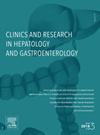Impact of frailty on outcomes and biliary drainage strategies in acute cholangitis: A retrospective cohort analysis
IF 2.6
4区 医学
Q2 GASTROENTEROLOGY & HEPATOLOGY
Clinics and research in hepatology and gastroenterology
Pub Date : 2025-03-03
DOI:10.1016/j.clinre.2025.102568
引用次数: 0
Abstract
Background
Acute cholangitis (AC) is a potentially fatal infection of the biliary tract characterized by varying degrees of severity, with endoscopic retrograde cholangiopancreatography (ERCP) serving as the primary drainage modality. Though frailty is linked to poor outcomes in general, its implications for AC patients remain unexplored.
Methods
Using the National Inpatient Sample Database 2017–2020, we identified adult AC hospitalizations, which were further stratified based on frailty. A multivariate regression model was used for analysis.
Results
We included 32,310 AC patients, out of whom 11,230 (34.76 %) were frail. Frail patients had elevated AC severity as well as in-hospital mortality (adjusted odds ratio [aOR] 6.89; P < 0.01). Additionally, frail patients were found to have significantly higher odds of complications including septic shock (aOR 15.87), acute renal failure (aOR 5.67), acute respiratory failure (aOR 11.11) and need for mechanical ventilation (aOR 13.80). From a procedural viewpoint, frail patients had higher odds of undergoing percutaneous biliary drainage (PBD) but lower odds of undergoing “early” ERCP (ERCP within 24 h of admission). When compared to non-frail counterparts, frail patients were more likely to undergo PBD as opposed to early ERCP (aOR 1.46; P = 0.01).
Conclusion
Frailty independently predicts poor AC outcomes and has a notable impact on the choice of biliary drainage procedure. Recognizing frailty instead of age alone as a determinant of AC outcomes can aid clinicians in risk stratification and guide tailored interventions in this population.
虚弱对急性胆管炎预后和胆道引流策略的影响:一项回顾性队列分析。
背景:急性胆管炎(Acute cholangitis, AC)是一种以不同严重程度为特征的潜在致命性胆道感染,内镜逆行胆管造影术(ERCP)是主要的引流方式。虽然虚弱通常与不良预后有关,但其对AC患者的影响仍未得到研究。方法:使用2017-2020年全国住院患者样本数据库,我们确定了成人AC住院,并根据虚弱程度进一步分层。采用多元回归模型进行分析。结果:我们纳入了32310例AC患者,其中11230例(34.76%)体弱。体弱患者AC严重程度和住院死亡率均升高(调整优势比[aOR] 6.89;结论:虚弱独立预测AC预后不良,并对胆道引流方式的选择有显著影响。认识到虚弱而不是年龄是AC结果的决定因素,可以帮助临床医生进行风险分层,并指导对这一人群进行量身定制的干预。
本文章由计算机程序翻译,如有差异,请以英文原文为准。
求助全文
约1分钟内获得全文
求助全文
来源期刊

Clinics and research in hepatology and gastroenterology
GASTROENTEROLOGY & HEPATOLOGY-
CiteScore
4.30
自引率
3.70%
发文量
198
审稿时长
42 days
期刊介绍:
Clinics and Research in Hepatology and Gastroenterology publishes high-quality original research papers in the field of hepatology and gastroenterology. The editors put the accent on rapid communication of new research and clinical developments and so called "hot topic" issues. Following a clear Editorial line, besides original articles and case reports, each issue features editorials, commentaries and reviews. The journal encourages research and discussion between all those involved in the specialty on an international level. All articles are peer reviewed by international experts, the articles in press are online and indexed in the international databases (Current Contents, Pubmed, Scopus, Science Direct).
Clinics and Research in Hepatology and Gastroenterology is a subscription journal (with optional open access), which allows you to publish your research without any cost to you (unless you proactively chose the open access option). Your article will be available to all researchers around the globe whose institution has a subscription to the journal.
 求助内容:
求助内容: 应助结果提醒方式:
应助结果提醒方式:


